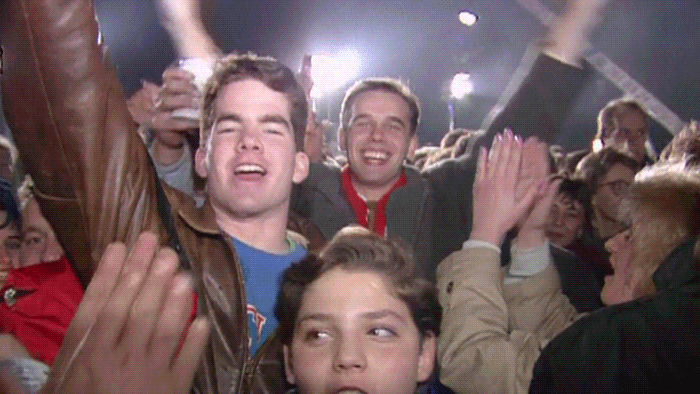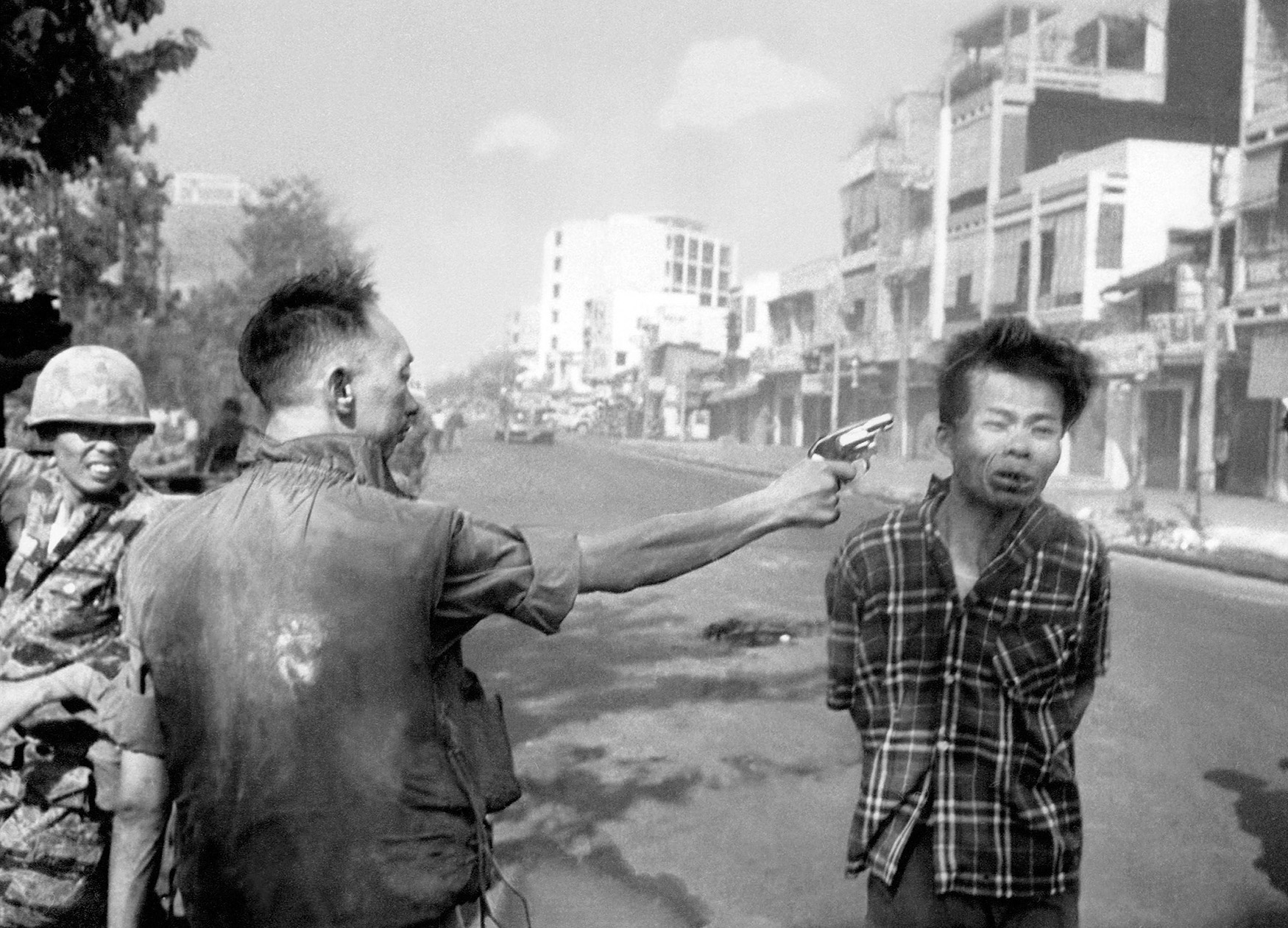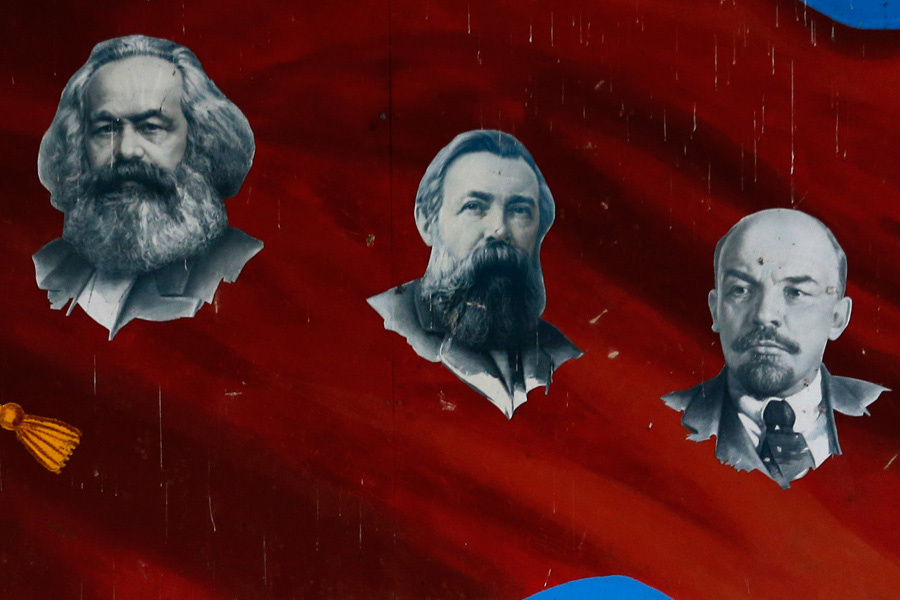AP Was There: The fall of the Berlin Wall

This story was first published on Nov. 9, 1989, and describes the moment when East Germany announced it was opening its borders .
The Associated Press is republishing the story to mark the 30th anniversary of the collapse of the Berlin Wall , an event that eventually led to the unification of Germany and collapse of the Soviet Union.
BERLIN (AP) —East Germany said today it was opening its borders to the rest of the world and that its citizens can travel or emigrate anywhere, including through the 28-year-old Berlin Wall.
Guenter Schabowski, a member of the ruling Politburo, said that those who want to visit other countries and then return would still need a visa, but that the visa requests would be handled without delay.
The stunning announcement comes on the heels of a remarkable series of events that has shaken this once rigidly controlled Communist nation.
Earlier today, new leader Egon Krenz and Schabowski both called for free and democratic elections, the main demand of a widening opposition movement.
Berliners sing and dance on top of the Berlin Wall to celebrate the opening of East-West German borders, Nov. 10, 1989, Berlin. (AP Photo/Thomas Kienzle)
Earlier this week, Krenz ousted the Politburo and replaced aging hard-liners with reformers in a desperate move to counter daily public unrest and the mass flight of tens of thousands of East Germans to the West.
Communist leaders also decided today to consider even more changes in the government hierarchy. The Communist Party’s Central Committee set a party conference for Dec. 15-17.
A party conference, a forum for making major changes in party policy, was last held in 1956. The official ADN news agency said the conference would discuss personnel changes in the 163-member Central Committee.
The move to open the borders comes after decades of fencing East Germans in to prevent their flight to the West. The Berlin Wall has divided Berlin and the two German nations since 1961.
In Washington, Secretary of State James A. Baker III said free travel for East Germans would be a “very positive development” that the United States would welcome.
“We’ve been talking a long time about freedom of travel being a basic human right. We’ve been talking a long time about open borders. We’ve been talking a long time about the importance of seeing the wall come down,” Baker said.
Schabowski said those who want to emigrate can go to West Germany directly without having to go through a third country. More than 50,000 East Germans have fled through neighboring Czechoslovakia since Saturday and about 200,000 have fled this year.
East German Rosemarie Doln is overwhelmed with emotion as she is welcomed by an unidentified relative at the opening of latest wall passage at Wollankstrasse in West Berlin?s district of Wedding, Nov. 13, 1989 in Berlin. (AP Photo/John Gaps III)
Schabowski told reporters in East Berlin that the decision was made during a Central Committee meeting. He said the decision means all East Germans “can travel over all East German border checkpoints.”
While stunning changes have taken place at the top, daily street protests have continued almost unabated for the last several weeks. About 40,000 people demonstrated Wednesday night in Neubrandenburg and near Karl-Marx-Stadt for free elections and an end to authoritarian one-party rule, ADN said.
In the first official Soviet comment since Krenz reshuffled the country’s top leadership, Foreign Ministry spokesman Gennady I. Gerasimov told a news briefing in Moscow today that it was clear East Germany was undertaking a “renewal of socialism.
“They’re improving the situation in the sense that they’re moving toward perestroika on their own terms,” he told a news briefing, referring to the Kremlin’s current program of reforms.
East German border guards stand in front of segments of the Berlin Wall, which were removed to open the wall at Potsdamer Platz passage, Nov. 13, 1989, in Berlin. (AP Photo/John Gaps III, File)
Krenz touched on the volatile topic of multiparty elections in a speech to the Central Committee that was published today in state newspapers. He called for a “new election law that ensures free, democratic general elections with a secret ballot. ”
He proposed “public supervision in every stage of the balloting.”
Krenz did not say whether he was urging a true multiparty system in East Germany. Officials already say elections are democratic, even though the system guarantees the Communists virtually unanimous approval.
Krenz also promised new laws on freedom of assembly, association and the press, but gave no details.
However, he did say independent groups might have a role in the nation’s politics as East Germany tries to recover from the shock of losing more than 200,000 mostly young, skilled workers to the West this year.
People walk along the Berlin Wall near Potsdamer Platz on the West Berlin side, Nov. 17, 1989. (AP Photo/John Gaps III)
Schabowski said earlier today that the Communists were ready to go into free elections “without any limits.”
“If we profess free elections here, then we are professing free elections without any limits and with all risks that are connected,” Schabowski told West Germany’s Westdeutsche Rundfunk radio.
East Germany’s pro-democracy opposition groups have made free elections their main demand, although Krenz has repeatedly said that any changes can’t jeopardize the Communist Party’s “leading role.” Party dominance also is embodied in the nation’s constitution and a constitutional change would be required to abolish it.
Guenter Hartmann, leader of the small National Democratic party that previously had closely followed Communist policy, also called for free elections today. Writing in the party’s National Zeitung newspaper, he questioned whether the constitutional article that guarantees the party’s leading role “could still stand.”
Meanwhile, a group of 15 prominent East Berlin Communist intellectuals and officials wrote a letter to the Central Committee suggesting the Berlin Wall be torn down in the near future.
Two Berliners chat in front of Brandenburg Gate in Berlin, Nov. 12, 1989 while having lunch on a visitor's platform near the Berlin Wall. (AP Photo/Lionel Cironneau)
“It is also imaginable, even in the foreseeable future, that the wall will become a relic of the past” if an agreement is signed with West Germany that would prevent “damage to the East German economy,” the group said.
The letter appeared today in the Berliner Zeitung, a newspaper of the city’s Communist Party organization. Among those who signed it were Heinz Albrecht, secretary for economy with the East Berlin party leadership, and Rolf Reissig, a member of the Academy of Social Science of the Central Committee.
Communist authorities built the Berlin Wall in 1961 to stop an exodus to West Germany. It became a symbol of the differences between East and West, differences that Soviet leader Mikhail S. Gorbachev has sought to erase by urging reforms in the Soviet bloc.
Krenz, who assumed power just three weeks ago, on Wednesday purged much of the old guard from the Communist Party’s ruling Politburo. The 21-member body was reduced to 11.
The leadership reshuffle swept aside nine aging Politburo members and brought in four new ones, including Dresden party chief Hans Modrow. Seen as a reformer, Modrow was proposed as the new premier when the 44-person Cabinet resigned en masse Tuesday.
Berliners sing and dance on top of the Berlin Wall to celebrate the opening of East-West German borders, Nov. 10, 1989, in Berlin. (AP Photo/Thomas Kienzle)
Heinz Joachim Nickel, right, a member of the East German opposition group "New Forum," is overcome with emotion as he and his son, Christian, center, arrive in Helmstedt, West Germany by train from East Germany, Nov. 11, 1989. Christian wears a cap belonging to an unidentified West German border guard, left. Nickel said he and his son will return to East Germany. (AP Photo/Claus Eckert)
A West German policeman, left, gives a helping hand to an East German border guard who climbs through a gap of the Berlin Wall when East Germany opened another passage at Potsdamer Platz in Berlin, Nov. 12, 1989. (AP Photo/Thomas Kienzle)
A man hammers away at the Berlin Wall on Nov. 12, 1989 as the border barrier between East and West Germany was torn down after 28 years, symbolically ending the Cold War. (AP Photo/John Gaps III)
A Trabant car, made in East Germany, with a graffiti quote, “Shall the laboring classes live on” is pictured driving in West Berlin, West Germany, November 11, 1989, two days after the boarder between the two Germanys was abolished. (AP Photo)
East German border guards are seen through a gap in the Berlin wall after demonstrators pulled down a segment of the wall at Brandenburg gate, Nov. 11, 1989, Berlin. (AP Photo/Lionel Cironneau)
Young East Berliners shout for joy as they run into West Berlin through an opening in the Berlin Wall near the Brandenburg Gate, Fri., Dec. 23, 1989. The new East German government had promised to fully open the gate by Christmas. (AP Photo/Hansjoerg Krauss)
East German border guards use a hose to discourage West Berliners near Brandenburg gate, in Berlin, Nov. 11, 1989. The citizens from the west tried to demolish the wall, demanding it be pulled down. (AP Photo/Lionel Cironneau)
East German demonstrators flash victory signs as they demand democratic reforms in a massive protest in downtown East Berlin, Oct. 7, 1989. (AP Photo/Heribert Proepper)
East German border guards have a coffee break atop of platform while looking down to just a few East German citizens moving into the west at Bernauer Strasse passage, in Berlin, Nov. 13, 1989. (AP Photo/Jockel Finck)
A crowd of about 10,000 East German refugees throng in the street outside the West German embassy in Prague, Czech Republic, before they are allowed to board busses to take them to special trains bound for West Germany, Wednesday, Oct. 4, 1989. (AP Photo/Dieter Endlicher)
Berliners celebrate on top of the wall as East Germans flood through the dismantled Berlin Wall into West Berlin at Potsdamer Platz, Sunday Nov. 12, 1989, in Berlin. (AP Photo/Lionel Cironneau)
East German border policemen, right, refuse to shake hands with a Berliner who stretches out his hand over the border fence at the eastern site nearby Checkpoint Charlie border crossing point, Friday morning, November 10, 1989, after the borders were opened according to the announcement by the East German government. (AP Photo/Lutz Schmidt)
An East German border guard peers through a crack in the Berlin Wall, Nov. 17, 1989, shortly after a West Berliner painted a keyhole around the opening. (AP Photo/John Gaps III)
Berlin schoolboys proudly show off bricks of the Berlin Wall they found near Brandenburg Gate in Berlin from last night's celebrations at the opening of the East German border to the West, Nov. 10, 1989. (AP Photo/Udo Weitz)
Kirsten, right, and Uta, left, from West Germany hold sparklers and a bottle of champagne as they wait on the New Year at the Brandenberg Gate, Dec. 31, 1989. Thousands of of visitors from East and West Germany will meet for a joint New Year's celebration. (AP Photo/Roland Melbrauch)
Thierry Noir of West Berlin sprays graffiti on the Berlin Wall in East Berlin near the Brandenburg Gate, Jan. 13, 1990. Before he could finish the job, East German police came and he had to escape through the hole in the wall. (AP Photo/Hans Joerg Krauss)
West Berliners release hundreds of balloons with photo of Mikhail S. Gorbachev and a message to the Soviet leader in front of Brandenburg Gate in West Berlin near the wall, Nov. 17, 1989. They wanted to say thank you to Soviet President Mikhail S. Gorbachev for pulling down the wall. (AP Photo/Thomas Kienzle)
A young man stands behind the Berlin Wall on the eastern side making victory signs to the West, March 2, 1990. In the back pillars of the Brandenburg Gate. (AP Photo/Rainer Klostermeier)
___
Follow AP’s full coverage of the 30th anniversary of the fall of the Berlin Wall at https://www.apnews.com/FalloftheBerlinWall
Visual artist and Journalist





